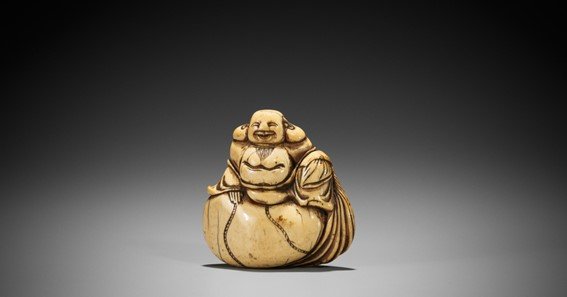Hotei, often recognized as the Laughing Buddha, is a beloved figure in Japanese culture, famous for carrying a treasure bag filled with symbolic items. This bag, known to hold riches, food, and other treasures, plays a crucial role in representing Hotei’s nature as a bringer of abundance, happiness, and contentment.
The Symbolism of Hotei’s Treasure Bag
Hotei’s treasure bag is not merely a container; it represents his generosity and the fulfillment of desires. According to Japanese and Chinese folklore, Hotei is considered one of the Seven Lucky Gods, embodying good fortune and happiness. His large, round belly and cheerful demeanor add to his image as a symbol of contentment and prosperity. The treasure bag is often depicted as overflowing, emphasizing his ability to provide for those in need and symbolizing the idea that happiness comes from sharing wealth and blessings with others.
Hotei’s Role and Influence
Hotei’s treasure bag is filled with magical items and gifts that he freely shares, embodying both literal and metaphorical treasures. This act of giving represents a spiritual lesson of abundance through generosity, a central theme in Buddhist and Taoist teachings. Additionally, some interpretations suggest that Hotei’s bag holds the burdens and problems of others, which he collects and alleviates through his joyous spirit.
FAQ
- What is inside Hotei’s treasure bag?
Hotei’s bag is said to contain riches, food, and other symbols of wealth. It is a metaphor for abundance and the fulfillment of spiritual and material desires. - Why is Hotei often depicted as laughing?
Hotei’s laughter signifies joy, contentment, and the carefree nature that he encourages followers to embrace. It’s a symbol of finding happiness in the present moment. - Is Hotei the same as the Buddha?
No, Hotei is not the Buddha. He is often referred to as the Laughing Buddha in Western culture, but he is a distinct figure known as a bodhisattva and a member of the Seven Lucky Gods in Japan. - What lessons does Hotei’s treasure bag teach?
The bag emphasizes the values of generosity, the importance of sharing one’s blessings, and finding happiness through giving rather than material accumulation. - Why is Hotei’s treasure bag significant in Japanese culture?
It represents luck, prosperity, and the concept that spiritual wealth—like joy and contentment—is as valuable as material wealth. His image is a reminder to seek fulfillment through compassion and generosity.
Hotei’s enduring popularity lies in his joyful image and the symbolism tied to his treasure bag, reflecting themes of generosity, abundance, and happiness across different cultures and religions. His story and imagery remain influential in both Eastern and Western contexts, representing a timeless message of finding joy in giving and simplicity.










